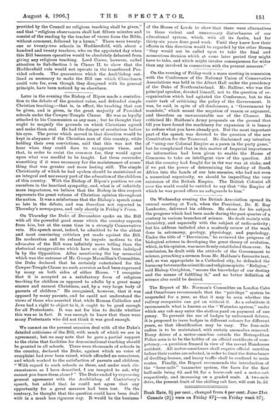On Thursday the Duke of Devonshire spoke on the Bill
with all the powerful good sense which the country expects from him, but at the same time in a strongly Conservative vein. His speech must, indeed, be admitted to be the ablest and most convincing criticism yet made against the Bill. Its moderation and its refusal to impute motives to the advocates of the Bill were infinitely more telling than the rhetorical exaggerations which have so often been indulged in by the Opposition. After mentioning the lay memorial which was the outcome of Mr. George Macmillan's Committee, the Duke declared that he certainly entertained for the Cowper-Temple Clause no such aversion as had been expressed by many on both sides of either House. "I recognise that it is accepted as a satisfactory form of religious teaching for children as opposed to adults by a great many sincere and earnest Christians, and, by a very large body of parents of children." He recognised, however, that it was opposed by many parents, and he could not understand the .views of those who asserted that, while Roman Catholics and Jews had a right to object to it, it ought to be good enough for all Protestants. It was not for him to decide whether this was so in fact. It was enough to know that there were many Protestants who did not think it was good enough.






































 Previous page
Previous page